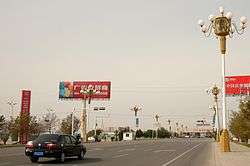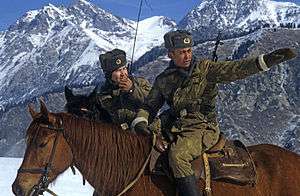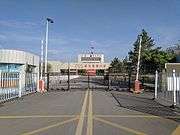Khorgas
Khorgas, officially known as Korgas[1] (simplified Chinese: 霍尔果斯; traditional Chinese: 霍爾果斯; pinyin: Huò'ěrguǒsī; Kazakh: قورعاس, romanized: Qorǵas), also known as Chorgos, Gorgos, Horgos and Khorgos, formerly Gongchen (拱宸城), is a Chinese city straddling[2] the border with Kazakhstan. It is located in the Ili Kazakh Autonomous Prefecture of the Xinjiang Uyghur Autonomous Region. The city on the Kazakh side of the border is also known as Khorgas (Kazakh: Қорғас, قورغاس, Qorǵas; Russian: Хоргос, Khorgos); the train station there is Altynkol (Russian: Алтынколь).
Korgas 霍尔果斯市 قورغاس شەھىرى | |
|---|---|
 China–Kazakhstan border crossing at Korgas | |
 Korgas Location in Xinjiang | |
| Coordinates: 44°07′32″N 80°24′52″E | |
| Country | People's Republic of China |
| Autonomous region | Xinjiang |
| Autonomous prefecture | Ili |
| Area | |
| • Total | 1,900 km2 (700 sq mi) |
| Population (2014) | |
| • Total | 85,000 |
| Time zone | UTC+8 (China Standard Time) |
As of 2019, the Khorgos area was a hub of the New Eurasian Land Bridge, 200 km from the Alataw Pass, the historically important Dzungarian Gate, with a cross-border visa-free special economic zone for trade and shopping (ICBC), a dry port for transporting goods and two new cities, one on either side of the border.[3]
Transportation
The Jinghe–Yining–Khorgos railway was completed in late 2009 and as of 2012 provides train service from Ürümqi and Yining to Khorgas.[4]
Passenger trains from Ürümqi started on July 1, 2010, however they initially only ran to Yining and not all the way to Khorgas.[5][6] In December 2013, one of the daily Ürümqi-Yining passenger trains was extended to Khorgas. The travel time from Khorgos to Yining then was just over an hour.[7]
In December 2011, a 293-km railway from the Khorgas border crossing to Zhetygen terminal (near Almaty) was completed; on December 2, 2012, the tracks from the Chinese and Kazakhstan sides of the borders were connected.[8] For some months, the railway on the Kazakh side was still operating in a test mode.[9] The railway border crossing (port of entry) at Khorgas became operational in the late 2012;[10]) the first regular trains from the two countries crossed the border on December 22, 2012.[8] Thus, Khorgos, an international dry port, connects land-locked Kazakhstan to the sea port of Lianyungang in China.[11]
The railway border crossing is expected to handle up to 15 million tons of freight per year initially, the volume rising to 30 million tons per year in the long run,[8] opening up the second Europe-China rail link via Kazakhstan.[12]
41-ton gantry cranes are used to move shipping containers between standard gauge Chinese trains and Russian gauge Kazakh trains.[13]
In June 2017, the Ürümqi Railway Bureau of the China Railway started daily passenger service from Ürümqi to Nur-Sultan via Khorgas.[14]
Economy
In 2017, robot manufacturing moved to Hogros as Boshihao Electronics moved production to the city from Shenzhen.[15]
See also
- Transport in Kazakhstan
- Railway stations in Kazakhstan
 The 1758 Victory of Khorgos, a 1774 engraving by Jacques-Philippe Le Bas (1707-1783), after Jean-Denis Attiret (1702-1768). Musée Guimet, Paris.[16]
The 1758 Victory of Khorgos, a 1774 engraving by Jacques-Philippe Le Bas (1707-1783), after Jean-Denis Attiret (1702-1768). Musée Guimet, Paris.[16] Khorgos Soviet-Chinese frontier post (1984)
Khorgos Soviet-Chinese frontier post (1984) Khorgas port gate
Khorgas port gate
References
- The official spelling according to Zhōngguó dìmínglù, 中国地名录 (Beijing, SinoMaps Press 中国地图出版社 1997); ISBN 7-5031-1718-4
- Reid Standish (1 October 2019). "China's Path Forward Is Getting Bumpy". theatlantic.com. 2nd paragraph of article: The Atlantic. Retrieved 17 March 2020.
Straddling the Kazakh-Chinese border, a collection of cranes, railways, and buildings rises out of a barren stretch of desert surrounded by towering mountains to form the backbone of the Khorgos Gateway
CS1 maint: location (link) - "Khorgos and Zharkent travel guide". Caravanistan. Retrieved 2019-08-19.
- "Xingjiang's first electrified railway rails laid". People's Daily Online. 2009-09-17. Retrieved 2012-03-13.
- Zhaoqian, ed. (2010-06-22). "Tickets of train from Urumqi to Yining put on sale". Tianshannet. Archived from the original on 2012-02-29. Retrieved 2012-03-13.
- "Xinjiang's first electrified railway passenger train". China Central Television. 2010-07-07. Retrieved 2012-03-13.
- 霍尔果斯往乌鲁木齐方向首趟客运列车正式开通 (The first Khorgas-Ürümqi passenger train started regular operations), 2013-12-26
- 写在中国霍尔果斯至哈萨克斯坦阿腾科里铁路通车运营之际, 2012-12-23
- Хоргос-Жетыген: уже летом первые поезда соединят Китай с Европой (Already this summer first trains will connect China with Europe), 2012-03-16 (in Russian)
- 新疆霍尔果斯火车站获批成立 年底有望通车 Archived 2013-07-29 at the Wayback Machine, 中国新闻网, 2012-11-23
- Vakulchuk, Roman and Indra Overland (2019) “China’s Belt and Road Initiative through the Lens of Central Asia”, in Fanny M. Cheung and Ying-yi Hong (eds) Regional Connection under the Belt and Road Initiative. The Prospects for Economic and Financial Cooperation. London: Routledge, pp. 119.
- Revival of the Silk Road
- Shepard, Wade (2017-02-20), "Khorgos: The New Silk Road's Central Station Comes To Life", Forbes
- 今夏可坐火车去哈萨克斯坦游玩 (This summer, one can visit Kazakhstan by train)
- Shepard, Wade. "Horgos: The First New City Of The New Silk Road Emerges As A Robot Manufacturing Hub". Cite journal requires
|journal=(help) - Victory of Khorgos